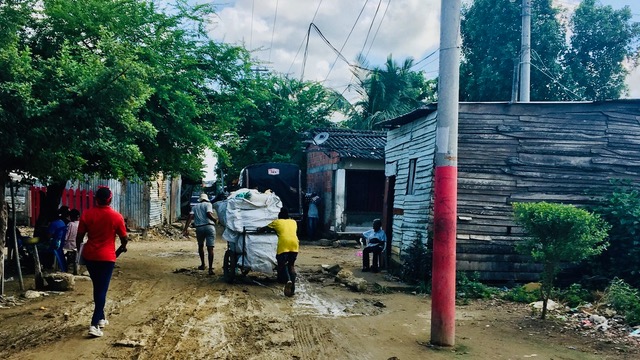Cette publication est également disponible en :
![]() Français
Français

Thesis defended by Laura Neville, December 7, 2023 – Institute of geography and durability (IGD).
From littered plastic bottles clogging canals, to heaps of construction waste forming land over water, failed dumpsite closures, or waste pickers displaced from recycling routes, urban disposabilities are manifestations of the multifaceted socio-material relations surrounding waste. The thesis examines these socio-material relations, as they unfold across urban scales, spaces and temporalities, and how they come to matter for shaping relational politics of place-making in the city. Treating waste and wasting processes as socially, culturally, economically, and politically situated, the thesis argues that urban disposabilities are shaped by historical continuities of structures of power, urban inequalities and are porous to complex forms of violence. By focusing on Cartagena’s inhabitants’ quotidian and mundane practices with garbage, it centres on the bodily process in and through which urban disposabilites are produced along dimensions of social class, race, and gender. Through bodily processes, relational politics of place-making are continuously enacted, contested and reshaped in and through waste. Waste is thus understood as constitutive of urban belonging and of relational politics of place-making. The openness of urban disposabilities suggests that garbage-based practices can underpin the social production of place-making, and foreshadow urban futures.
Drawing on ethnographic research in Cartagena de Indias, Colombia, the thesis traces the circulation, (im-)mobility and containment of household waste in low-, lower middle-, and high-income neighbourhoods, to explore residents’ coping mechanisms in the absence of waste infrastructures in a self-built settlement; inhabitants’ social imaginaries of waste management in a lower middle-income neighbourhood; residents’ aspirations of household recycling in elite spaces; and waste pickers’ everyday arrangements over waste materials across the city. The diverse practices examined, despite not being overtly conflictual, are all means of making subtle claims and producing place with waste.
The juxtaposition of the inhabitants’ garbage-based everyday practices reveals the reconfiguration of gendered, race and class relations and subjectivities, and the contradictions inherent to relational politics place-making. Firstly, it shows the class-based discourses, meanings, symbolism, socio-material and political relations surrounding waste practices – through which urban inequalities are reproduced in the city. Secondly, it sheds light on the body, as an intimate site of political possibilities and, of the reproduction of urban inequalities. It highlights the processes reproducing the racialisation of Afro-Colombian bodies and subjectivities through gendered infrastructural household waste labour. It argues that embodied relational politics of place-making unfold with more-than-human materialites, and racialisation represents shared experiences of continued proximity with waste materials and toxins. Thirdly, it shows everyday encounters with the state, unfolding through waste practices – revealing the state’s ambivalent presence – and drawing intimate relations between the inhabitants and wider structures of power, which, in subtle ways, shape urban belonging and the possibility to make claims on the city.
The thesis presents a contribution at the intersections of feminist urban political ecology, Black Geographies, postcolonial urban studies and decolonial Latin American debates, proposing novel ways of reading the inherent plurality of relational politics of place-making as inhabitants in urban contexts contend with ever-evolving waste challenges.


